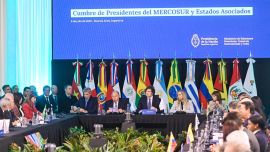It is a sign of how bad things are in Argentina that an accord for billions of dollars in extra loans from the International Monetary Fund hardly caused a ripple in the bond market.
The nation’s bonds maturing in 2035 are little changed since just before President Alberto Fernández’s administration reached an agreement with the Fund’s staff on March 1 for US$44 billion in extra financing. The debt remains deep in distressed territory around 30 cents on the dollar, indicating the country could default on the foreign debt it restructured just two years ago.
While much of the accord is conditional on Argentina reaching fiscal and monetary targets, many analysts see the Latin American government as incapable of weening itself of the loose spending policies that help it to hold onto power, but also fuel rampant inflation. The outlook got even more sombre as Russia’s invasion of Ukraine pushed up commodity prices, adding to the problems of an economy in perpetual crisis.
“At the end of the day the IMF is not the problem,” said Diego Ferro, founder of M2M Capital in New York. “Argentina is the problem, because it’s doing a pathetic job of having a credible economic plan, or a team that will be able to execute that plan.”
The IMF’s executive board approved the 30-month Extended Fund Facility at a meeting Friday, allowing for the immediate disbursement of US$9.7 billion, the Fund said in a statement. In total, it’s a US$44-billion agreement that the IMF said aims to provide Argentina with balance of payments and budget support backed by measures designed to strengthen debt sustainability, tackle inflation and boost reserves.
The Economy Ministry didn’t respond to a request from Bloomberg News for comment.
Regime change
While most sovereign bonds rally in the immediate aftermath of a deal with the IMF, Argentina’s bondholders were distinctly unimpressed.
“People have finally figured it out,” Ferro said. “The only thing driving Argentine bonds is regime change in 2023,” he added, referring to the next presidential elections.
Investor cynicism is understandable. Over more than 60 years, Argentine leaders have agreed to a string of financing programmes with the IMF, with only a few lasting more than 24 months. Even the previous programme under ex-president Mauricio Macri in 2018, which came alongside dramatically tighter fiscal and monetary policy, failed to cool inflation or make the debt more sustainable.
Argentina’s dollar bonds due in 2030 and 2035 are both down this year to 33 and 30 cents, respectively, little changed since just before the IMF deal was agreed. Investors still demand more than 1,750 basis points over US Treasuries to hold the sovereign debt, according to JPMorgan Chase & Co, well above the 1,000-basis point level considered in distress.
Default risk
Credit-default swaps indicate an 89 percent chance that the government will fail to stay current on its obligations to bondholders over the next five years.
“There is a high bar for a sustained rally in Argentina’s sovereign dollar bonds,” said emerging markets economist Nikhil Sanghani at Capital Economics Ltd. “Investors need to see action, rather than words, toward policy tightening and/or market-friendly reforms.”
Of course not everyone is so sceptical. Siobhan Morden, head of Latin America fixed-income strategy at Amherst Pierpont, pointed out the “waning influence” of more radical members of the government as highlighted by Argentina’s vote on the IMF programme.
Several lawmakers in the far-left wing of the bloc voted against the deal, but they failed to block it. They did however stop short of allowing the economic policies to underpin the programme.
“This reinforces a declining influence of radicalism and reaffirms our view of a decisive gradual policy and political transition,” she said. Now, “the more important phase shifts to how much adjustment is feasible under the limited policy flexibility of the ideological constraints and external shocks.”
Nathalie Marshik, a managing director for fixed income at Stifel Nicolaus & Co, said for the bonds to get out of distress, investors would need to see “genuine economic good news that point to a serious retrenchment of inflation.”
That “means a fundamental change in the way the fiscal accounts are managed and how the government finances its deficit,” she said. “You would need pension, labor reform to get rid of indexation.”
To make the stakes even higher, of all the IMF’s outstanding credits to countries, Argentina’s is by far the biggest.
related news
by Sydney Maki & Scott Squires, Bloomberg



















Comments